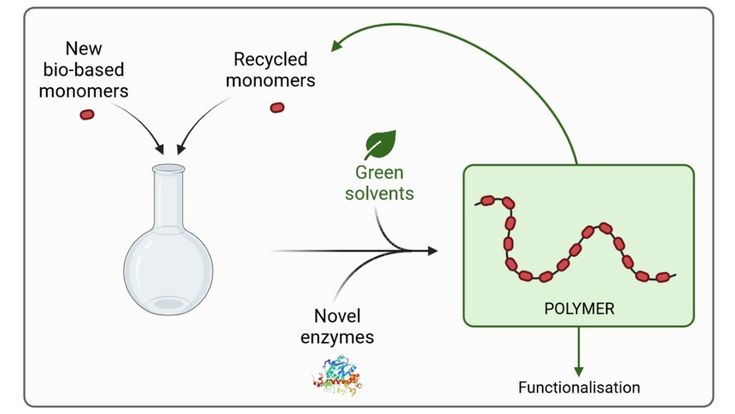Chemo-enzymatic strategies for polymer synthesis and biodegradation
SUPERVISOR: Georg M. GÜBITZ
PROJECT ASSIGNED TO: Cicely WARNE
In recent years, the demand for petrochemical-based plastics has increased rapidly. This is due to their inexpensiveness, durability and wide range of properties. However, the qualities that make them an attractive material in industry also make them an environmental problem. Plastics are not degraded in biological pathways and therefore accumulate in the environment. The vast majority of them are also made from fossil hydrocarbons, a finite resource.
There is therefore, a need for both novel polymers derived from renewable resources, and better recycling methods for synthetic polymers. A possible solution for the problem has been found in nature; enzymes have been found to degrade polymers with a heterogeneous atom backbone such as polyurethanes, polyamides and polyesters1, as well as catalyse polyester synthesis2. Enzymes are considered ‘green’ catalysts due to their preference for mild conditions and inherent biodegradability.
There is a need for better materials for biomedical applications, and bio-based polymers could potentially address this. Polymers have been previously functionalised to improve antimicrobial activity3, and biopolymers in particular are considered an good candidate for tissue engineering4.
The purpose of this thesis is the synthesis and functionalisation of both new bio-derived polymers and polymers synthesised from recycled materials, utilising novel enzymes, solvents and monomers to do so. Throughout this project, the methods and materials will be continuously evaluated to make sure they are as sustainable and green as possible, reducing the impact on the environment.

Figure 1. Representation of the enzymatic polycondensation reaction
1. Mohanan, N., Montazer, Z., Sharma, P. K. & Levin, D. B. Microbial and Enzymatic Degradation of Synthetic Plastics. Frontiers in Microbiology 11, (2020).
2. Hevilla, V., Sonseca, A., Echeverría, C., Muñoz-Bonilla, A. & Fernández-García, M. Enzymatic Synthesis of Polyesters and Their Bioapplications: Recent Advances and Perspectives. Macromolecular Bioscience 21, 2100156 (2021).
3. Bösiger, P. et al. Enzyme functionalized electrospun chitosan mats for antimicrobial treatment. Carbohydrate Polymers 181, 551–559 (2018).
4. Bedian, L., Villalba-Rodríguez, A., Hernández-Vargas, G., Parra, R. & Iqbal, H. Bio-based materials with novel characteristics for tissue engineering applications – A review. International Journal of Biological Macromolecules x, (2017).
